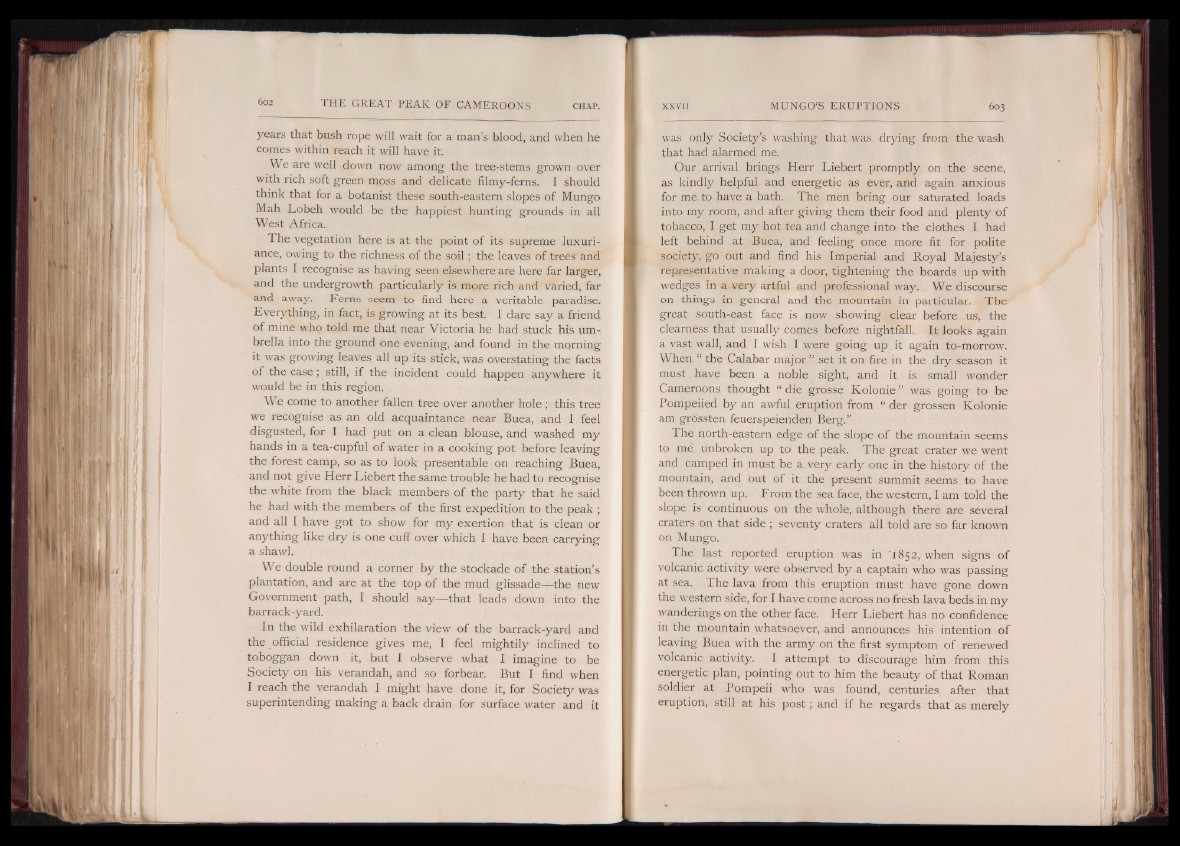
years that bush rope will wait for a man’s blood, and when he
comes within reach it will have it.
We are well down now among the tree-stems grown over
with rich soft green moss and delicate filmy-ferns. I should
think that for a botanist these south-eastern slopes of Mungo
Mah Lobeh would be the happiest hunting grounds in all
West Africa.
The vegetation here is at the point of its supreme luxuriance,
owing to the richness of the soil; the leaves of trees and
plants I recognise as having seen elsewhere are here far larger,
and the undergrowth particularly is more rich and varied, far
and away. Ferns seem to find here a veritable paradise.
Everything, in fact, is growing at its best. I dare say a friend
of mine who told me that near Victoria he had stuck his umbrella
into the ground one evening, and found in the mqrning
it was growing leaves all up its stick, was overstating the facts
of the case; still, if the incident could happen anywhere it
would be in this region.
We come to another fallen tree over another hole; this tree
we recognise as an old acquaintance near Buea, and I feel
disgusted, for I had put on a clean blouse, and washed my
hands in a tea-cupful of water in a cooking pot before leaving
the forest camp, so as to look presentable on reaching Buea,
and not give Herr Liebert the same trouble he had to recognise
the white from the black members of the party that he said
he had with the members of the first expedition to the peak ;
and all I have got to show for my exertion that is clean or
anything like dry is one cuff over which I have been carrying
a shawl.
We double round a corner by the stockade of the station’s
plantation, and are at the top of the mud glissade— the new
Government path, I should say— that leads down into the
barrack-yard.
In the wild exhilaration the view of the barrack-yard and
the official residence gives me, I feel mightily inclined to
toboggan down it, but I observe what I imagine to be
Society on his verandah, and so forbear. But I find when
I reach the verandah I might have done it, for Society was
superintending making a back drain for surface water and it
was only Society’s washing that was drying from the wash
that had alarmed me.
Our arrival brings Herr Liebert promptly on the scene,
as kindly helpful and energetic as ever, and again anxious
for me to have a bath. The men bring our saturated loads
into my room, and after giving them their food and plenty of
tobacco, I get my hot tea and change into the clothes I had
left behind at Buea, and feeling once more fit for polite
society, go out and find his Imperial and Royal Majesty’s
representative making a door, tightening the boards up with
wedges in a very artful and professional way.. We discourse
on things in general and the mountain in particular. The
great south-east face is now showing clear before us, the
clearness that usually comes before nightfall. It looks again
a vast wall, and I wish I were going up it again to-morrow.
When “ the Calabar major” set it on fire in the dry season it
must have been a noble sight, and it is small wonder
Cameroons thought “ die grosse Kolonie ” was going to be
Pompeiied by an awful eruption from “ der grossen Kolonie
am grossten feuerspeienden Berg.”
The north-eastern edge of the slope of the mountain seems
to me unbroken up to the peak. The great crater we went
and camped in must be a very early one in the history of the
mountain, and out of it the present summit seems to have
been thrown up. From the sea face, the western, I am told the
slope is continuous on the whole, although there are several
craters on that side; seventy craters all told are so far known
on Mungo.
The last reported eruption was in T852, when signs of
volcanic activity were observed by a captain who was passing
at sea. The lava from this eruption must have gone down
the western side, for I have come across no fresh lava beds in my
wanderings on the other face. Herr Liebert has no confidence
in the mountain whatsoever, and announces his intention 6f
leaving Buea with the army on the first symptom of renewed
volcanic activity. I attempt to discourage him from this
energetic plan, pointing out to him the beauty of that Roman
soldier at Pompeii who was found, centuries after that
eruption, still at his post; and if he regards that as merely